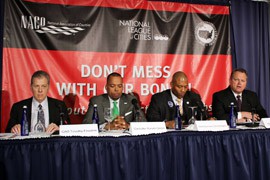Cronkite News has moved to a new home at cronkitenews.azpbs.org. Use this site to search archives from 2011 to May 2015. You can search the new site for current stories.
Mesa mayor says lifting bonds’ tax-exempt status could hurt cities
WASHINGTON – While much of Washington is focused on the impact of Friday’s “sequestration” cuts, Mesa Mayor Scott Smith is worried that a proposed solution to that problem could end up seriously hurting cities.
Smith and other county and city leaders were in Washington Wednesday to warn that a plan to raise revenue by eliminating the tax exemption for municipal bonds could lead to job losses, fewer public projects and higher taxes.
“This kind of action, while it appears that it solves Washington’s problem, has a ripple effect that is beyond serious,” Smith said during a briefing at the National Press Club. “It’s just a bad solution.”
Smith, who serves as vice president of the U.S. Conference of Mayors, was joined by officials from the National League of Cities and the National Association of Counties who came to tell Congress “Don’t Mess With Our Bonds!” – as the bright-red sign behind the four speakers read.
They also released a report showing that state and local governments financed more than $1.65 trillion of infrastructure projects in the last decade using tax-exempt bonds. Arizona borrowed more than $36 billion for 808 issues in the same period, it said.
Municipal bonds are used by cities to raise money for public works projects. Smith said they have been tax-exempt for 100 years, through two world wars and numerous financial crises, and their tax status makes them attractive to investors and, in turn, cheaper for local governments.
But some in Washington are now eyeing that tax-exempt status as a loophole that could be closed to help generate more revenue. While that has been suggested before, Smith said local leaders are worried it could happen this time.
He said bond tax is being targeted because it appears to benefit wealthy investors, but that lifting the tax-exemption would hurt everyone, especially those in middle- and low-income brackets.
Without the tax exemption, Smith warned, local governments would have to pay more for projects, forcing them to do fewer projects or raise taxes to recoup their costs. Fewer projects would mean fewer construction jobs, among other effects, which no one wants, he said.
In addition, Smith said any outstanding debt would be subject to taxes if the exemption were removed.
“I don’t think those in Congress and the administration fully understand the impact that will have,” Smith said after the briefing.
National Association of Counties President Chris Rodgers called tax-exempt bonds “the single most important mechanism to help us trigger and finance infrastructure.” Every state benefits from them, he said, and lawmakers should pay attention to those people at the bottom who will be affected by changing the law.
Smith called for Washington to take the bonds issue off the table, saying the potential “ripple effect” is dangerous for cities and is not a real solution to Washington’s problems.
“When we don’t have real solutions we look for easy ways out,” Smith said. “This, we perceive, is an easy way out.”
The tax-exempt program “has survived wars and the Great Depression,” Smith said. “Our concern is that it will not survive the Great Dysfunction, and that’s what we have here in Washington.”








